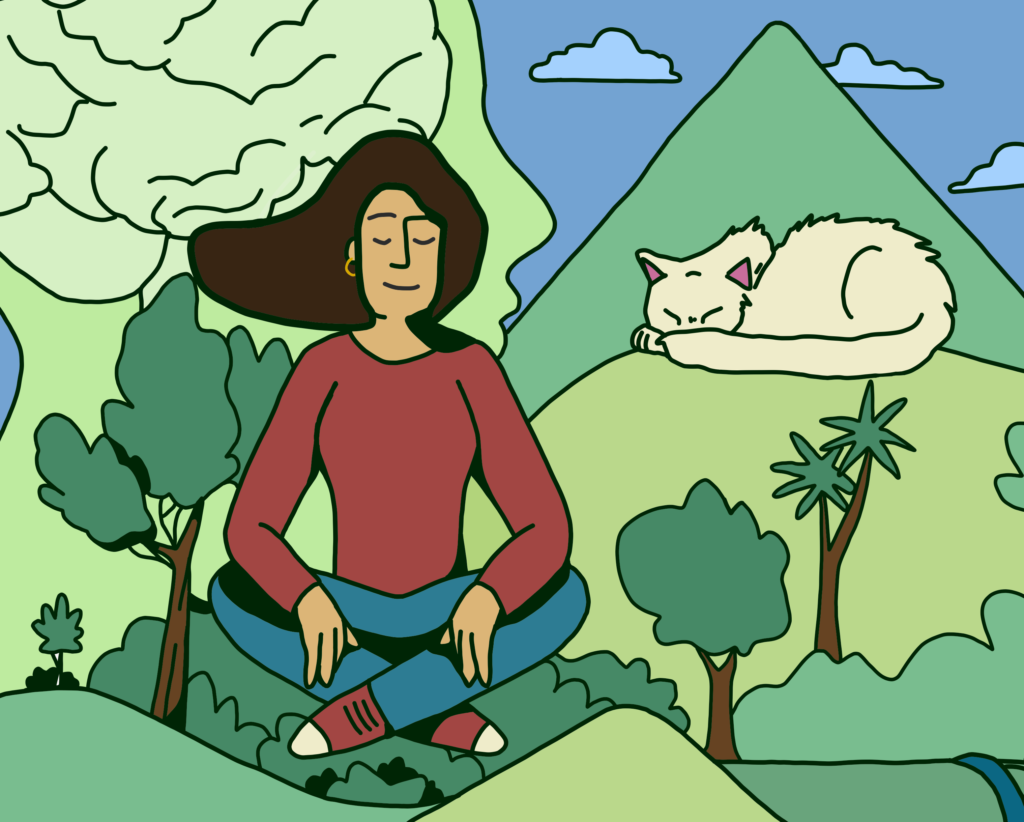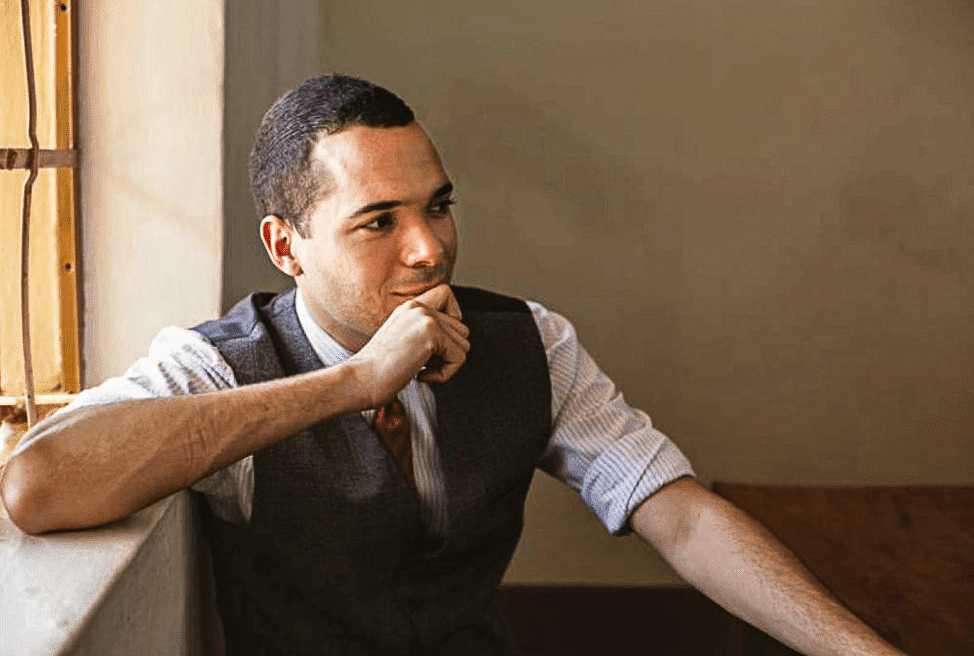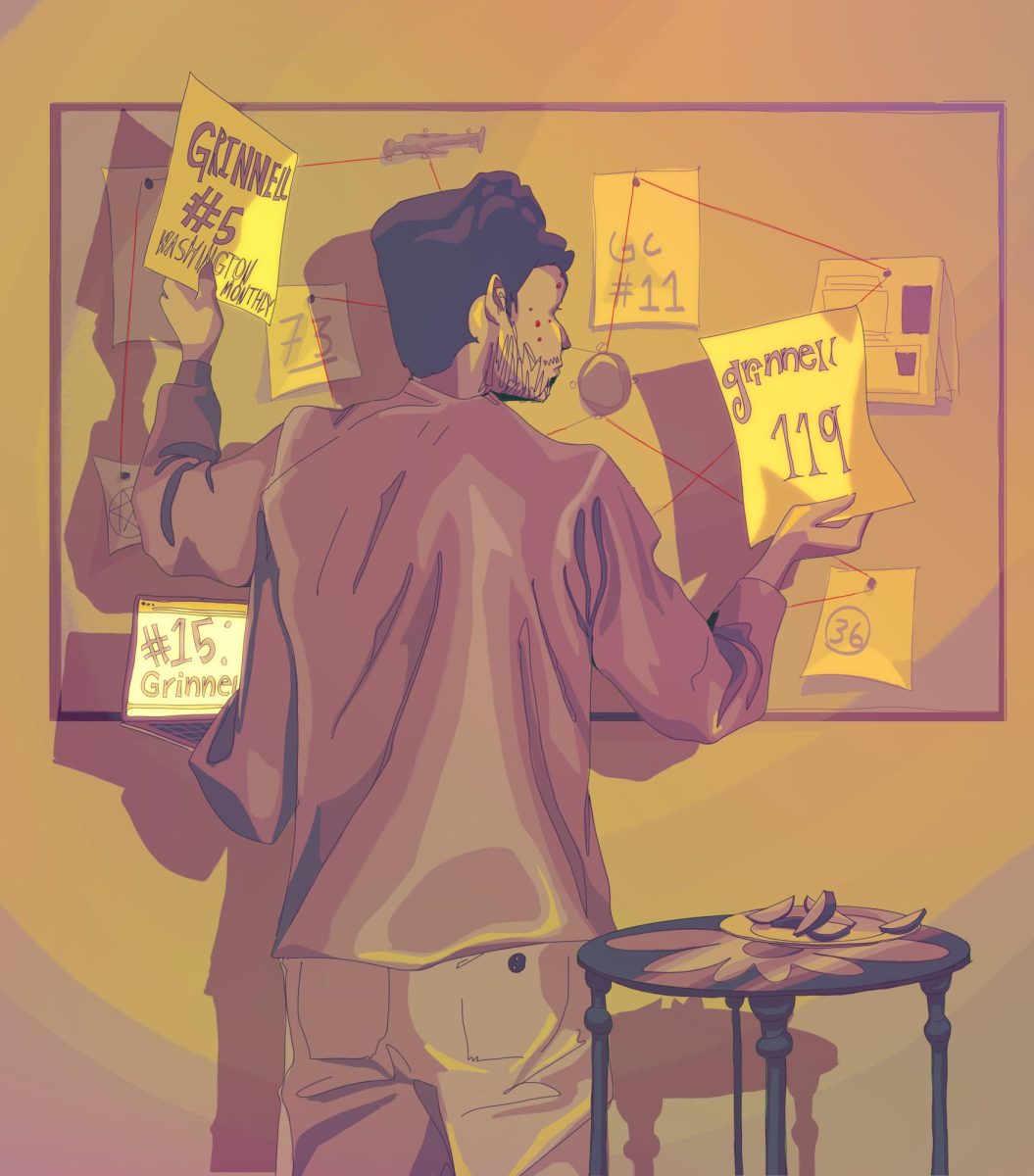2021 Iowa College Media Association award winner, First Place – Best Print/Online Opinion
This article is a part of The S&B’s Anniversary Project. See the entire project here.
Mental Musings explores mental health from the perspective of a low-income urban Latina woman throughout her 20-year journey with issues such as anxiety and depression. Each week, the column will dive into various topics related to mental health through personal narratives as well as one-on-one interviews.
Five months after the evacuation, I still couldn’t pack. I cried every single time I finished stuffing another duffel with enough clothes to last for the last months of warmth. Most of my fall and winter clothes remained carelessly tossed in a large blue bin that I’d been given for free in the Read first floor lounge; I could barely remember my own possessions; it had been so long since I’d seen them out of storage.
As I collected my belongings from my apartment in Evanston and drove back to Grinnell for the first time since March, I twisted my thin necklace of a lotus flower between my fingers. My grandma had placed it around my neck just before I left her. As she beamed at how happy she was for me, I worried I wouldn’t see her again; she is immuno-compromised, and my mom is a school librarian, which meant that both would be exposed to others five days a week. And besides, the last time I packed like this, I left everything I had ever known outside of my childhood, and I did so without knowing when I would go back.
Something happened to me the week of the evacuation, something I’ll never be able to fully explain. The metaphor I’ve settled for is this: my mind slipped into another reality, one clouded with a thick fog. I wandered to and from my classes, cried with my friends, got my tattoo touched-up in Younker and procrastinated packing, all with only a thin semblance of consciousness. The last Saturday I was on campus, my advisor came to help me move my bins into his house so I wouldn’t have to pay for storage. I let him into my dorm and walked him up the stairs to my bare dorm room. I showed him down the hall and guided him to my door. As we both stepped inside, I kept asking myself, “How did I get here? My advisor is standing in my empty dorm room in the middle of March.”
I’ve always been known for my sharpness; with one email, the pre-existing issues of my psyche unraveled themselves. Throughout April and May, so many moments passed that nearly convinced me that I had lost myself within a deeply complex nightmare, and that perhaps, if I blinked enough times, I’d wake up. Of course, I didn’t. None of us did. No matter how many parties I wandered into, how much wine I indulged in, every morning I opened my eyes and my reality remained shattered. I had lost myself somewhere in the pieces.
Throughout April and May, so many moments passed that nearly convinced me that I had lost myself within a deeply complex nightmare, and that perhaps, if I blinked enough times, I’d wake up. Of course, I didn’t. None of us did.
As much as I try, I don’t remember most of the spring and summer of 2020. The fog consumed all the energy I possessed. Any I managed to collect I quickly lost to inexplicable hysterics, which took the form of some of the worst panic attacks I’ve had to date. But just as quickly as the panic erupted, I would be unable to move, completely immobile on the living room couch and only able to watch movies that had a sense of familiarity. Somehow, in my deepest moments of grief, rewatching the Hunger Games movies in an endless cycle made me feel temporarily warm. Once I tired of the Hunger Games, I read the Heroes of Olympus series for the first time, and I devoured all five books within a month. Losing myself in fantastical and dystopian worlds was the only emotional stimulation I could handle.
Even still, the fog persisted. My family, quarantined with a broken young woman who shifted from high anxiety to deep depression in a matter of hours, found themselves at a loss. Eventually, it became clear I needed external help, and since my therapist is licensed in Iowa, I decided to sign a lease for an apartment in Grinnell. This way, I could gain access both to my therapist and her network of psychiatrists. Of course, finding a psychiatrist in this country is never that simple. The process took two months; I spent hours during F1 calling offices only to be told they didn’t take my insurance. Voicemails with my name, number, and the basics of my journey through mental health were left in countless inboxes that never returned my call. And in the midst of a 7.5-week term, I continued in the endless cycle of extreme highs and lows. I of course, managed a smile on my face, camera on, make-up intact, homework complete. In hindsight, as I reflect on the exhaustion I feel as I complete Spring 1, I truly don’t understand how I managed the term system unmedicated.
Finally, at the end of October, I found a psychiatrist, and within 45 minutes, she prescribed me Zoloft. Zoloft? I just told you I can’t face certain parts of my college campus without crying, and that the smell of the cold makes me nervous, and you’re giving me Zoloft? Despite my confusion, I took what I could get. Shortly after, I was placed in isolation after being exposed to Covid, and only when I didn’t react poorly to 14 days of complete isolation did I realize that I had underestimated the power of a small green pill.
After a month of taking Zoloft, I checked in with my psychiatrist to evaluate if I needed to up my dosage or change medications. Just before I logged in to our video call, I found the official post-appointment form from our first meeting in my portal. It was there that I first saw my official diagnosis: generalized anxiety disorder (no surprise there) and adjustment disorder with mixed anxiety and depressed mood. Adjustment disorder? What the hell is that? My mom has always said I’m not good with change, but that just sounds wrong. After a lot of googling, I found the definition from the DSM-V, the central book used to diagnose mental disorders.
DSM-V. Table 13. 9. Adjustment Disorder.
- The development of emotional or behavioral symptoms in response to an identifiable stressor(s) occurring within 3 months of the onset of the stressor(s).
- These symptoms or behaviors are clinically significant, as evidenced by one or more of the following:
Marked distress that is out of proportion to the severity or intensity of the stressor, taking into account the external context and the cultural factors that might influence symptom severity and presentation.
Significant impairment in social, occupational, or other important areas of functioning.
- The stress-related disturbancedoes not meet the criteria for another mental disorderand is not merely an exacerbation of a preexisting mental disorder.
Specify if:
Acute: If the disturbance lasts less than 6 months
Chronic: If the disturbance lasts for 6 months or longer
Now, I had a few issues with this diagnosis. First off, the phrase “Marked distress that is out of proportion to the severity or intensity of the stressor.” Based on the timeline of adjustment disorder, this means that my distress post-evacuation during an ongoing pandemic has been deemed “out of proportion” to the severity of the situation. I know I lost my shit, but was I supposed to maintain my sanity while completely isolated from all those within my age group, and after suffering trauma from being rushed off my college campus?
Second, let’s discuss this idea of “cultural factors”. I am a Latina woman, who for the last four years has had to watch as people who belong to my community are kept under inhumane conditions at the border. During the last year, both Black and Latinx people were infected and died disproportionately to white people. Don’t cultural factors such as those listed indicate that my distress is indeed not “out of proportion”?
Finally, point C mentions that it can’t be connected to another mental disorder. Did it not say generalized anxiety disorder above adjustment disorder? I may have a hard time facing realities, but I know I read the form correctly. I could go on, but all this to say: I am having a hard time adjusting to my adjustment order diagnosis.
My discomfort with the label placed on me led me to conduct basic, surface-level research on adjustment disorder. I wanted to know what other hypothetical life events, besides a global pandemic of course, could prompt a person to be diagnosed with adjustment disorder. My findings took me by surprise. Lists included the following: “Surviving a disaster such as a flood or hurricane, divorce or ending a relationship, death having an accident, undergoing a major transition in life, such as retiring from a job, getting married, moving, having a baby, developing a serious illness, having a loved one who becomes ill, or being a victim of crime or abuse.” Addiction Hope reported that “diagnosis of adjustment disorder is becoming more common, with an estimated incidence of 5-21% among psychiatric consultation services for adults.” Additionally, the website reported that “adult women are diagnosed twice as often with adjustment disorder as are adult men.”
The inclusion of events such as the death of a family member and the experience of any form of abuse does not sit right with me. Who decides what behaviors are deemed “out of proportion” to such events? The answer is subjective. Any one person could draw the line. The definition does specify that the behavior interrupts various functions of life. But should events such as these not interrupt our daily functions? How can we be expected to adjust properly to situations that affect our psyche and stability in the deepest sense?
I know I’m not a psychiatrist; but I do know my own mind. What I experienced during the summer I’ve experienced before, particularly after incredibly traumatic moments in my adolescence. I had previously experienced eviction trauma after being gentrified out of my childhood apartment in Chicago when I was 15. The rushed packing, the impulsive tossing of my belongings, and the vacant mattresses of my dorm all brought back the emotions of leaving behind familiarity under strenuous circumstances. The extreme ups and downs, the panic attacks that occurred after any reminder of the evacuation, all point to trauma rather than “marked distress’ that is “out of proportion” to the stressor.
My diagnosis does not speak to the skill or character of my psychiatrist. I can assure you, she’s a sweet woman, and she means well. I’m sure, based on her training, that adjustment disorder best fits what she heard in the short amount of time we spoke. My diagnosis does, however, speak to the way mental health is characterized within the field of psychiatry itself. The human mind and psychological trauma are much more complex than any of us give them credit for. How can my mind have crafted such a mess out of the past, created connections between songs from the last weeks of normalcy to pain, the smell of snow to trauma? Intersectionality plays an additional role in this thought process: what events of my past, as a low-income woman of color have influenced my reactions to this current historical trauma?
How can my mind have crafted such a mess out of the past, created connections between songs from the last weeks of normalcy to pain, the smell of snow to trauma?
The definition does specify that in chronic cases of adjustment disorder, the symptoms may last six months or longer. This could make sense; even while medicated, I found myself distressed to leave my apartment in Grinnell. I feared I’d never go back. I packed like I wouldn’t. Even now, I still avoid certain t-shirts and dresses that I remember wearing the last days of in-person classes. Campus will always hold certain ghosts for me, and even in the brightest places, I might not ever unsee the scattered belongings in Read, or the tears in my fourth-year friends’ eyes as they realized their senior year was over.
Maybe some of what my psychiatrist perceived isn’t completely incorrect; but the reality of what my mind went through is not as simple as the definition makes it out to be. I am not having a hard time adjusting – I’m fucking traumatized. We all are.
Any opinions expressed through columns and other S&B opinions publications belong to the writer and do not reflect the views of any or all members of the S&B staff, nor by any Grinnell associated organization.






























































